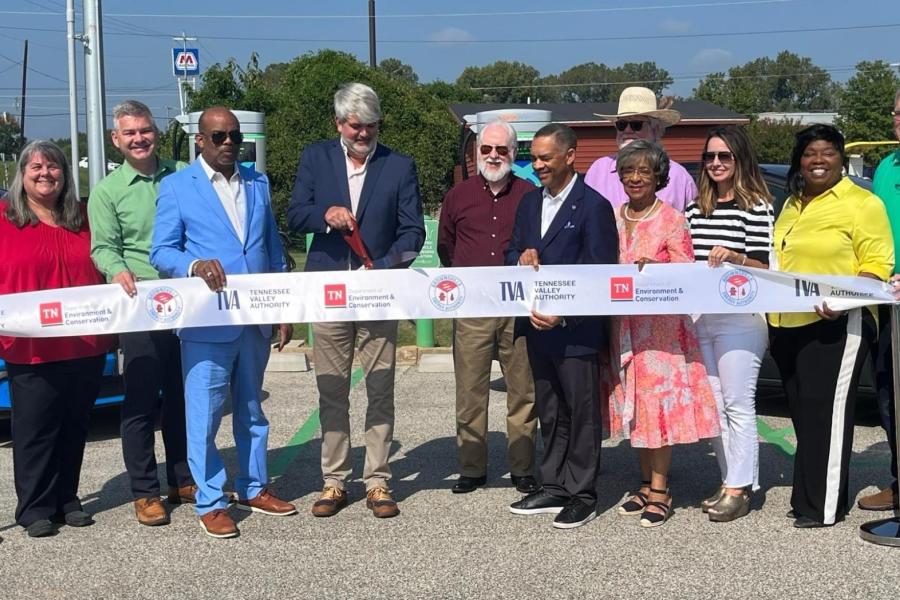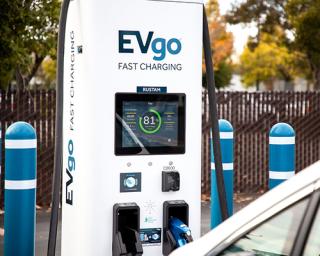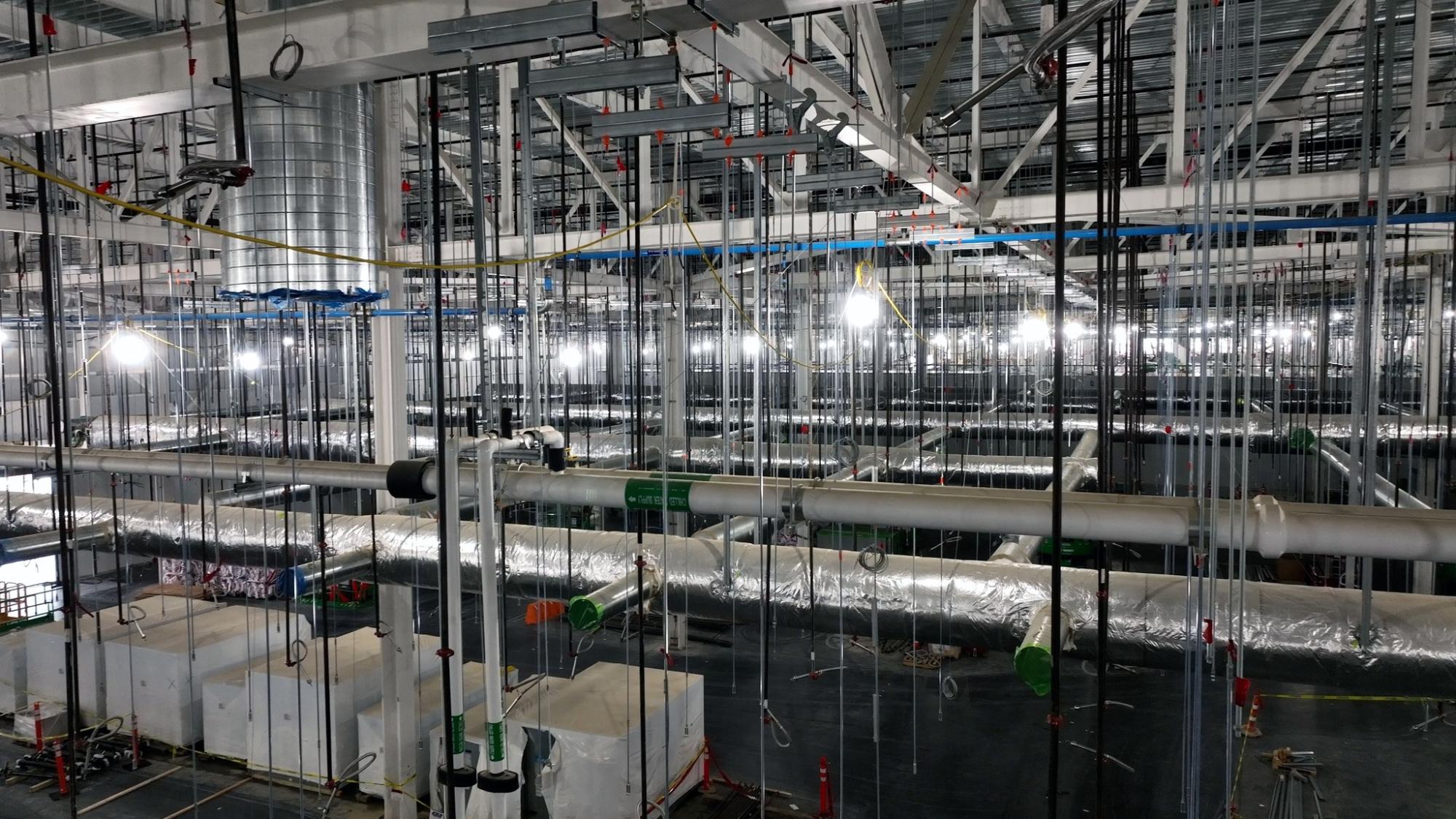EV adoption projected to increase as public, private investment increases charging options

By KATE COIL
TT&C Assistant Editor
While electric vehicle sales are less than industry experts predicted, continued investment in EV infrastructure is expected to help bridge the gap.
Officials with Ford announced they would be scaling back investments in Kentucky, but that construction of Tennessee’s Blue Oval City will continue as expected in light of consumer demand. Officials with the company said EV sales are still growing, but have been less than initially predicted – possibly the result of a lack of EV infrastructure in the U.S. as well as consumers switching first to hybrid vehicles before making the EV switch.
Beth Emmons, director of community relations with TDOT, said EV infrastructure remains a good investment for Tennessee for multiple reasons.

“TDOT can't predict the future, but it is assumed EV adoption will accelerate as more stations go online and the current gaps are filled,” Emmons said. “The Tennessee Clean Fuels Coalitions have set a goal to have at least 200,000 EVs in Tennessee by 2028; and the automakers that have set up shop in Tennessee have - or will be - producing electric vehicles. Smaller communities could benefit from more EV industry suppliers setting up camp near the automotive plants. There is also potential as the workforce moves to more EV-related skills.”
Alexa Voytek, deputy director of TDEC’s Office of Energy Programs, said the office tracks EV adoption statewide through the Tennessee Department of Revenue’s records of active EV registration. At present, there are just under 35,000 EVs on the roads in Tennessee – up from a mere 4,000 in 2019.
“We are seeing the percentage of growth increase quarter over quarter,” Voytek said. “We are still essentially on track to meet the goal of 200,000 EVs on the roads by 2028. We have worked with TVA on some of the key market barriers to adoption. Infrastructure deployment is obviously one of those key market barriers we’ve been chipping away at.”
In addition to EVs for the general public, Voytek said the agency may also eventually roll out new goals for electric buses and fleet semi-trucks as heavier duty EVs come on the market. New federal tax credits are also allowing local governments to receive direct payments for adding EVs to their fleets as well as charging stations to city properties. The Tennessee EMPOWER project, led by the East Tennessee Clean Fuels Coalition, is also working with employers, including government entities, to determine if workplace charging infrastructure is a good fit for their place of business.
PUBLIC INVESTMENT
Emmons said work continues on the Tennessee Electric Vehicle Infrastructure (TEVI) program, which itself is a part of the National Electric Vehicle Infrastructure (NEVI) program funded under the Infrastructure Investment and Jobs Act. The state expects to receive approximately $88 million from the federal government over a five-year period to executive the TEVI deployment plan approved by the federal government in fall 2022 and updated in summer 2023. The goal of the plan is to provide an EV charging network with high-powered fast chargers every 50 miles along Tennessee’s interstates and U.S.-64, which are the state’s designated Alternative Fuel Corridors.

Over the summer of 2023, Emmons said TDOT and TDEC worked together to release their notice of funding opportunity (NOFO) for the TEVI program.
"Awardees will purchase, install, own, operate, maintain, and report on program-funded EV charging infrastructure throughout the state of Tennessee,” Emmons said. “In response to the NOFO, 167 applications were submitted, from a combination of public and private partners, to fulfill 32 gap areas along Tennessee’s Alternative Fuel Corridors; we intend to announce awards by mid-January 2024.
Building this statewide EV fast charging network will power the growth of EVs across Tennessee and reduce barriers to transportation electrification. Tennessee is investing in its future and is paving the way to lead the nation as an EV epicenter.”
Meanwhile, TDEC is partnering with TVA for the buildout of the Fast Charge TN Network, which will install fast charging stations every 50 miles on major roadways, including secondary highways and interstates. Mark Finlay, senior energy analyst with TDEC, said much of the Fast Charging TN Network will supplement the TEVI plan and will serve largely rural communities.
“Really over the course of the past year, these installations have been going up across the network and TVA’s entire service area – which includes the vast majority of Tennessee,” Finlay said. “In Tennessee, there are currently 10 of these sites live. Eight of them have been funded directly by TVA. Two more have been funded through TDEC’s participation in the program. Going forward, there are approximately 30 more sites that have been approved or have a local power company under contract. Of those, 11 will be through TDEC and the remaining 19 will be through TVA. There is a good spread across the state where those will be located. They are primarily located in more rural areas, and a lot of the reason for that is to fill in where those infrastructure gaps are.”
Voytek said Tennessee State Parks have been the focus of another charging network project with TDEC and electric vehicle manufacturer Rivian. The company plans to install charging stations at all viable Tennessee State Parks with no cost to the state.
“Most of those are live at this point, and it’s a great complement to the Fast Charge Network,” Voytek said. “You can use the Fast Charge Network to get to the state parks and then top off once you’re there.”
PRIVATE INVESTMENT
As a result of these programs, Voytek said private industry is starting to take charge of further buildout.

“There is a decent amount of investment being made outside of state and utility investment,” Voytek said. “State and utility investment can help build that minimum, viable backbone of charging infrastructure, but then the private sector can come in and take it from there. We are already starting to see some of that with Pilot opening a couple of fast charging locations in Tennessee in the past few months. We have also heard recently about partnerships with Buc-ee's and others to build more charging stations throughout the state.”
As more private sector investment continues, Finlay said new EV charging programs will focus on areas that are not currently attracting private sector investment, such as rural destinations and multi-family housing developments. Finlay said money for these programs will come from the Volkswagen Settlement Environmental Mitigation Trust funding, similar to how the Fast Charge TN Network is being funded.
“One of the main of the goals of these programs, including Fast Charge and others we have on the horizon for Level 2 charging funding is to really identify those areas that are suited for public investment in order to help catalyze the market. Rural destination charging and multi-family housing charging are two use cases we identified that are primed for public investment right now in order to help build that infrastructure baseline and feel needed infrastructure gaps. These may not see necessarily profitable returns for an investor in the short term as EV penetration is still relatively low. What we are seeing is that for truck stops and corridor charging areas, there is a significant and growing business case.”
MADE IN TENNESSEE
Voytek said the state is also working with innovators and researchers to find answers to challenges associated with the grid in order to support this charging infrastructure build out.
“Tennessee Tech University is doing a lot of work in demonstration in rural applications for charging and deployment. Dr. Pingen Chen has received a couple of awards from the Department of Energy to do this work, not only in the Upper Cumberland region of Tennessee, but in broader Appalachia, which comprises a big part of rural Tennessee as well. He has one initiative called Rural Reimagined that is focusing on rural EV charger deployment and building economic development use cases for communities. There is another initiative or project we are a part of called the SMART Project that he is the lead on as well. It is looking at areas where it may be cost prohibitive to upgrade the electrical grid to support charging deployment. What he is doing is an innovative, first-of-its-kind use of used electric vehicle batteries (a second-life battery demonstration) as energy storage to support mobile, non-grid-tied solar-assisted Level 2 chargers.”

In addition to added infrastructure, the fact that so many EVs are – or will be – made in Tennessee is one of the major factors Voytek said contributes to why many Tennesseans are choosing EVs for their next vehicle.
“Partly we are seeing adoption go up because we are seeing new models from all automakers, so the number of options keep increasing,” she said. “I expect we will see some favoritism toward vehicles that are made in Tennessee because they are locally produced vehicles. Another thing to consider is that now that we have had EVs around for a bit, we are also seeing more options in the used EV space. A lot of people aren’t in the financial position to buy a new car, but that is a way for more people to adopt an EV. With the Inflation Reduction Act, you can also get the tax credit for used EVs as well as new EVs, which makes it more affordable.”
Finlay said dealership education has also improved, allowing them to provide better information to consumers on cost benefits, tax credits, and other advantages of EV ownership.
“We are also recognizing the need to have dealerships on the ground know how to sell these things and answer questions with the public,” Finlay said. “That was something that was lagging behind when the options for EVs started to a grow a few years ago, and we are seeing that catch up.”
Ultimately, Voytek said EV adoption will increase as more consumers find it a better investment and fit for their lives, especially as tax incentives encourage adoption.
“For me, the most compelling reason to drive an EV is the fuel and operational cost savings you see over time with an electric vehicle. In Tennessee, we are unique in that we have some of the most affordable electricity rates in the country. That means we have that much more to gain by using that cheap electricity as a transportation fuel. I think that’s a huge added benefit.
